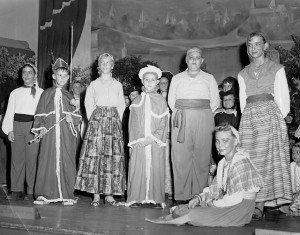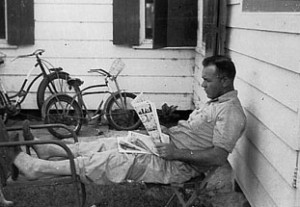Historical Essay 40
1953 at Deerfield Elementary School
Published: 20 Nov 2008
While my father, Marlin Eller, was busy serving on the Deerfield Beach City Commission, I was enjoying myself in the sixth grade at Deerfield Beach Elementary School. At first we didn’t have a teacher for our grade so Mrs. Henry, the principal of the school,did the teaching until Mrs. Sawitzke arrived to take over the job. She was a very good teacher and even introduced us to acting in a play about gypsies. I was King of the Gypsies and Lynda Dame was Queen. It was a little embarrassing because over the previous summer Lynda had grown to be about 6 inches taller than I was. I don’t think she grew an inch after that summer, so I eventually caught up and passed her in height. The “lead” actors in the play (left to right) were Tommy Gannon, yours truly David Eller, Lynda Dame, Richard Rieth, Jimmy Phillips, Peggy Hahn (seated) and Beatrice Manning. Richard Rieth was the shortest member of our class, but very smart in math and science. He wrote the following: “With the help of my scientific mind and my chemical analysis, I am going to try to look into the future and tell what I see my classmates doing 10 years from now. I see, yes, I see Dewey Bennett playing big league baseball with the New York Grankees, I mean, er…the New York Yankees. I also see Tommy Gannon leading a big band in New York, and his name in neon lights. As for Mildred Gordon I see her as a nurse working in the largest hospital in the world. Yes, and David Eller playing baseball with the Boston Beans, oh, I mean the Boston Red Socks. As for Beatrice Manning I see her working as a clerk in a bakery. I also see Diane Ash as a schoolteacher teaching sixth grade, and doing just as wonderful a job as our teacher Mrs. R.S. has done. The night of our operetta, there was a big movie producer from Hollywood, California in the audience, who promised great careers for Peggy Hahn and Lynda Dame. Now they can be seen in the great musical hit South Atlantic. I also see Jimmy Phillips working in a circus as a trapeze artist. Yes, and Donald Williams and James Stills becoming great farmers and growing new kind of fruit trees by use of chemicals and grafting. With Deerfield growing as it is, I see a newspaper all its own, published and edited by Janice Brown and Jessie Beard, with the gossip column headed by Susan Whitney. As for myself, with my interest in electricity and my experimenting with chemistry, I’ll be lucky if I’m still here 10 years from now.” Richard Rieth. Note: One of his predictions came true: Tommy Gannon, a tremendous trumpet player even in sixth grade, went on to have his own big band in California. Richard Rieth graduated from our high school a few years later and received a full scholarship to Rensselaer Polytech University in New York to study engineering. He went on to help develop our modern telephone systems. Yours truly, David Eller, ended up as publisher of the newspaper in Deerfield instead of Janice Brown and Jesse Beard. And finally, Mildred Gordon wrote the following poem dedicated to the graduating sixth grade class at Deerfield Elementary School in 1953:
Six more years have we to go
down the path of life abroad,
Down the sunny lane to school
Where we always obey the rule.
We’re half way through the school life now,
Six more years upon our brow.
When it’s hot when it’s cool
We’ll still be in school;
Even though we’re half way through
We’ve still got six years to do
Now we sing farewell to you
And to wondrous teachers too
David Eller, Publisher 11-20-08
Historical Essay 39
Elected to the Deerfield Beach City Commission
Published: 16 Oct 2008
Elected to the Deerfield Beach City Commission in 1953, my father, Marlin Eller, had campaigned on promises to the voters to build more parks and recreational facilities for the town. Once elected, however, he found out that the town was nearly broke and, thus, could not afford any such projects. Dad was very frustrated. He had hoped to build a boat ramp on the Hillsboro River in Pioneer Park and a fishing pier and pavilion at the beach. But the city did not have enough tax money coming in to afford such projects. Frustrated, he started looking into the city finances. The problem was that most of the land in Deerfield was owned by the Kester family of Pompano Beach, who also owned the only bank in the area, the Pompano State Farmers Bank. Mr. Kester was content to keep the hundreds of acres of land he owned in Deerfield essentially undeveloped, since it was on the tax roll valued at only $500 per acre, and, thus, did not cost him much each year in taxes to leave it undeveloped. Dad suspected that the Kester land was undervalued. He decided to get an opinion from one of the only real estate brokers in the area at the time:
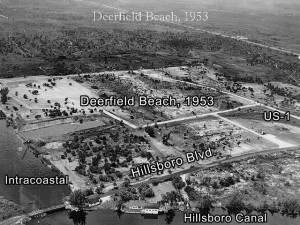
Boynton Realty (See previous Essay No. 19 ). Shortly thereafter, Boynton Realty notified Dad that they had a qualified buyer who would pay $1,500 per acre for the Kester owned property in Deerfield. Dad had the city clerk notify Mr. Kester that the city was going to meet on a certain date and vote to increase the taxable value on his property to $1,500 per acre. Mr. Kester was not a happy camper. In fact, he showed up at the meeting, stood up and angrily said that he would sell every piece of property he owned in Deerfield if they raised the tax value to $1,500. Dad responded by asking him if he was sure of that? Mr. Kester responded in the positive. With that said, Dad invited Mr. Forney Horton of Boynton Realty and his client Robert Sullivan to the podium. Mr. Sullivan presented a letter from his bank guaranteeing that the funds were available to buy the approximate 500 acres of land at $1,500 per acre that the Kesters owned in Deerfield, running from Hillsboro Boulevard to the current Lighthouse Point boundary and from the Intracoastal Waterway to Federal Highway. Mr. Kester, apparently surprised, immediately agreed to the sale, in front of the whole audience. Thus, the City of Deerfield nearly tripled its income that night, and Dad was able to proceed in accomplishing his promises for a boat ramp, a fishing pier and a beach pavilion for the citizens.
David Eller Publisher 10/16/08
Historical Essay 38
Marlin Eller, my father, wins big in 1953 election … for Deerfield City Commission
Published: 2 Oct 2008
Dad ran for the Deerfield City Commission in 1953 and won, receiving nearly 80 percent of the votes cast. In fact, he got more votes than anyone else running for any of the commission seats that year. There were only a little over 500 voters in that election, and Dad got more than 400 to vote for him. He was 37-years-old and very happy. Deerfield did not have a City Manager form of government at that time. It had a mayor and four commissioners, each of which was responsible for managing a portion of the city government. Each commissioner selected the part of the city government he or she would like to “run.” The commissioner who received the most votes could select first. There was a commissioner responsible for utilities, a commissioner responsible for streets, another for the fire department and another for the police. Dad selected to be the commissioner of police. It was not such a big job, because there were only four or five policemen. Deerfield even had its own small jail at the time, approximately where the city council chambers are located today. The police also had their office there. It was only a block from our house and factory, which made it very convenient for Dad to go there as needed. Dad had not run on a campaign to be the Commissioner of Police. He actually ran on a campaign to improve and increase the city’s parks and recreational areas. Once elected, however, he realized he could do more for the city as Police Commissioner to fight for some other issues which were festering in our small southern town. For instance, Deerfield had a sizable black population, but had no black policeman. Crime was rampant in the black neighborhoods, and the white policemen seemed afraid to go there. When they did, there seemed to be a tendency to use too much force, out of fear, or other reasons. Dad had many friends in the black community who had supported him and quietly solicited their help to find the right person to hire. Meanwhile, he started working on other projects which the city needed. The most urgent was that there were not street markers at the corners of most streets which identified the street. Without street signs, it was very difficult for visitors to find their way around. Dad brought it up at his first commission meeting. The city clerk, Mr. Richardson, reported that Deerfield’s budget did not include any money for pursuing such a project.
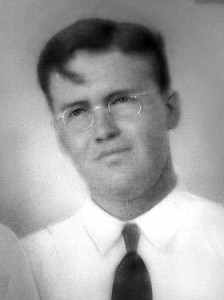
In frustration, Dad blurted out that he thought he could get concrete street markers donated from the new concrete company which had recently moved into town. The other commissioners then agreed that if Dad could get the street markers donated, they would pay to get them installed… The new concrete company Dad was depending on to make the donation was located just east of the Sea Board Railroad crossing, where JM Family’s headquarters is today. Dad had done the owner a few favors by working at nights and on weekends doing some emergency welding and machine work on some of the concrete company’s equipment. He took me with him on Saturday morning to see the owner, a tall bald headed man, and make the request. I could tell Dad was a little nervous. He finally got the request out for 6- by 6-inch concrete pilings, 5 foot long to be donated to the city. Without hesitation, the owner said, “Marlin, is that all you want? Just let me know how many. It would be our pleasure.” By the following Saturday, the piles were delivered to our shop. That’s when I learned that it was going to be my job to help paint the street numbers, through stencils, on the pilings. When I think about it, I can still smell the black asphalt based paint we used to give Deerfield its first street markers.
David Eller Publisher 10/02/08
Historical Essay 37
President Eisenhower’s Inauguration … caused me to break my arm
Published: 28 Aug 2008
I was 11 years old, and maybe it wasn’t directly Ike’s fault. But if it hadn’t been for his being inaugurated as U.S. President on January 20, 1953, I probably would not have broken my arm that day. It began with my mother, who was President of the PTA at Deerfield Elementary, requesting Mrs. Hendry, the principal of DeerfieldElementary School, to allow me to leave school early and come home to watch the inauguration on our new television set. Mrs. Hendry approved it with the caveat that I was to give a report to the class the next day. When I got home from school to watch, my parents along with some neighbors, were already watching the 14-inch black and white TV in our living room. It was a little after 11 a.m., and after about 30 minutes of watching politicians talk, I got bored. I heard the announcer say that the big event, or actual inauguration itself, would not take place until noon. My parents were busy watching the TV and talking to their friends, so I decided to slip out into the backyard to play on the new monkey bars Dad had recently made for me. I climbed to the top and instead of using my hands like you’re supposed to do, I decided to see if I could walk across the top of the bars. That was a big mistake because I didn’t even get a third step
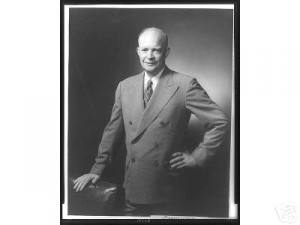
in when I found myself falling and twisting at the same time. I put my right arm out to break the fall and landed on the palm of my hand with a stiff arm carrying all my weight. A loud cracking sound of my right arm breaking … is a sound I will never forget. The pain was intense. Crying and embarrassed, I ran back into the house holding my arm. Everyone followed me out into the backyard as I explained what happened. The closest hospital to Deerfield at the time was the Good Samaritan Hospital in West Palm Beach. My parents let their friends and neighbors stay to watch “Ike” get inaugurated as president on our new TV, while they drove me to the hospital. My parents were especially irritated as it turns out because it was the first time either had a chance to actually see a live presidential inauguration. Things did not get better at school the next day. Mrs. Hendry, the principal, saw me coming into school with a cast on my arm. She asked me what had happened. I told her. She looked upset as she said: “I let you out of school to watch the presidential inauguration, and you went playing instead! I’m surprised at you David. See what happens when you don’t do the right thing!” I never forgot her scolding. If I had been watching the inauguration like I was supposed to be doing, I wouldn’t have gotten hurt. Another lesson learned.
David Eller, Publisher
Historical Essay 36
A Giant Catfish and the Devil … got me into trouble!
Published: 14 Aug 2008
I was a very busy boy in my eleventh year of age in 1953. My job every Saturday morning, working in my father’s machine shop as an assistant to Roosevelt LeGreer, was now bringing me in one dollar each week, which Dad paid me with four quarters. I kept two of those quarters in my pocket to spend and saved the other two in a glass canning jar made by the Ball Company, with a brass colored metal threaded cap on top. I kept the jar in my bedroom on a shelf next to my bed. Every day I counted the quarters, so I knew exactly how much money I had. I decided then to only spend two quarters each week, one half of my income, and save the rest for what some people might call a rainy day. But in my case, I was thinking about saving for times like when the fish weren’t biting (see previous Essay No. 35). It is a habit I never broke and continue to this day. My Saturday afternoons were filled with Little League Baseball practice or games. My Sunday mornings were taken up with Bible study at First Baptist Church. Most Sunday afternoons were spent with my mother visiting my grandparents, aunts, uncles and numerous cousins in Boynton Beach. Therefore, between work, baseball and church, I wasn’t getting in much fishing anymore. I really missed it. So I started thinking about my weekly schedule and what I could do to get in more fishing time? Suddenly, an idea entered my eleven-year-old brain from somewhere, which my mother later said was the Devil. I could hide one of my fishing poles and some bait down by the Hillsboro Canal, about where the dock and boat ramp is today. After Sunday School, I could walk into the church, making sure my parents saw me, and then scoot out the back door before service started and run down about 100 yards to the canal where I’d hidden my fishing gear the night before. I could then fish for about an hour and then show up back at church about the time the service was getting over. My scheme worked the first week. It also worked the second week. However, by the third week the Holy Scripture prediction “be sure your sins will find you out” came true for me. I hooked and caught the largest catfish I had ever seen, even until today. It was about 30 inches long and twenty-five pounds in weight. I fought him for about thirty minutes before I was able to slide him up on shore. I knew church was going to be over soon, so I ran the 200 yards or so to my house to get my wagon. I ran back with it and loaded the catfish in the wagon. I pulled the wagon with the fish as fast as I could through Pioneer Park to our house where the tennis courts are today. I left the catfish still breathing in the wagon in our backyard and ran east through the park again to the church. Fortunately Reverend Rowe was long-winded that day, and I arrived back to church just as people were coming out. Mom was the first to spot me as I tried to stroll casually up to the church, breathing heavily. “Where were you during church, David?” she asked. I couldn’t lie to my mother so I just blurted it out, “Mom, you got to see this huge catfish I just caught!” She didn’t smile. Neither did Dad. The ride home seemed to take forever. First out of the car, I ran to my wagon and pulled it with the catfish right up to the back door seeking approval. Dad didn’t even come out to look at it. Mother came out, took one look at it and said loudly, “David, that is a Devil fish! The Devil made you skip church and go fishing! Now take that fish and throw him back into the river!” I did, and the catfish, still alive, slowly swam away. I never fished on Sunday morning again — even up unto today. David Eller, Publisher
Historical Essay 35
Fired at age 10….so I go fishing
Published: 24 Jul 2008
I first started work when I was nine years old. My Dad cut off my 25 cents per week allowance and told me I had to start working for a living. He offered me a job paying 50 cents per week to sweep and clean up his office adjacent to our machine shop, which was next door to our house on Dixie Highway. The job had to be done every Saturday morning. Dad also had a long time African-American employee named Roosevelt LeGreer who swept up the rest of our shop. Roosevelt and I were good friends, but I always felt funny when he would call me “Mr. David”. Dad liked him, too. He even gave him his own water fountain. There was a little sign above that fountain that said “colored”. I tried it out one day but I couldn’t tell any difference in the taste from the water in the other water fountain, and it didn’t seem to have any color to it either. When I asked my Dad about it, he seemed to get a little embarrassed. The next day the sign was down, the fountain was gone, and Roosevelt had to drink from the same fountain as everyone else. When I reached ten years old Dad was still only paying me 50 cents per week. I wanted to make more money. I asked Dad how could I make more money. I understood him to say something to the effect that to make more money you had to do more work, and suggested I talk to Roosevelt. Roosevelt suggested I take over the part of his job, which included cleaning up the metal shavings falling to the floor from the lathe cuts. It was hard work using a shovel, a broom and a wheelbarrow. I worked hard the first Saturday, filling up the wheelbarrow and dumping the shavings in the scrap yard area behind the shop. When I finished, I went to Dad expecting to get at least 75 cents. Dad grinned and suggested I go talk to Roosevelt, “because he hired you.” When I asked Roosevelt for my money, he just shrugged his shoulders and said he didn’t have any money. Then I heard the other workers laughing, including my Dad. They thought it was funny, and I was the butt of the joke. However, at ten years old I didn’t think it was funny. So I took the wheelbarrow back out to the scrap yard and loaded all the shavings back into it. I rolled the wheelbarrow back through the shop right to my Dad’s office. My Dad had already gone back inside. I dumped the whole wheelbarrow load of steel shavings out right in front of my Dad’s office door as the workers continued to laugh. I scooted out the side door toward our house to get my fishing pole when I heard my Dad come out of his office and shout; “You’re fired!” I didn’t really know what that meant, but I knew I wasn’t going to work for him or anyone else and not get paid. So I rode my bike down to Pop’s Fish Market, which at the time was on Dixie Highway about a block south of Hillsboro Avenue. I went in to speak to Pop. A kindly older man, who generally wore a cap, he knew me well. I asked him how much he would pay me if I caught fish for him. He said he would advance me bait on credit and pay me 5 cents a pound for mullet and junk fish, and 10 cents a pound for snapper or snook (which were legal to catch at the time). So I went to work for Pop. I went back home and got my cast net, my gig, and two more rods and reels. I set up on the Dixie Highway Bridge going over the Hillsboro Canal and started fishing. By five o’clock that afternoon I had caught twelve mullet with my cast net, eight mangrove snappers with my rods and reels, and gigged a fifteen-pound snook. I put them all in my wagon and rushed back to Pop’s.
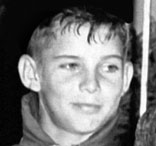
He weighed everything and paid me $2.80 after taking out for the bait. Back home in time for supper I proudly displayed the money from my afternoon’s “work”. Mother was proud and Dad seemed impressed. He apologized for teasing me at the shop and told me I could have my job back and he’d pay me 75 cents. I promptly declined and told him, “Why would I work for you for 75 cents on Saturday when I can make $2.80 fishing?” Dad just smiled and seemed to agree. So the next Saturday I started fishing early. I fished all day and only caught two little snappers and three mullet. Pop paid me 30 cents after deducting for bait. The same thing happened the next Saturday. Fishing was bad for some reason. Maybe the moon wasn’t right? Anyway I decided by the next Saturday that the assured 75 cents from Dad for a couple hours work in the shade was a lot better than fishing all day in the sun for 30 cents. Dad agreed to hire me back, and the rest is history.
David Eller Publisher
Historical Essay 34
“Be careful who you talk about in Deerfield”
Published: 10 Jul 2008
In Deerfield, the Butlers are related to the Wiles and the Jones… who are 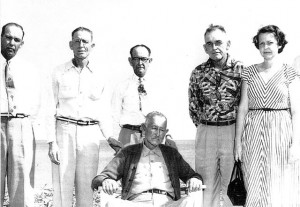 related to the Rileys… who are related to… etc. I remember my mother, Lorena Eller, once giving advice to a new friend who had just moved into the small town of Deerfield in the old days, i.e. 1950’s. “Be careful who you talk about in Deerfield,” my mother advised, “because a lot of people here are related to each other.” That is bound to happen in any small town, of course, and
related to the Rileys… who are related to… etc. I remember my mother, Lorena Eller, once giving advice to a new friend who had just moved into the small town of Deerfield in the old days, i.e. 1950’s. “Be careful who you talk about in Deerfield,” my mother advised, “because a lot of people here are related to each other.” That is bound to happen in any small town, of course, and
Deerfield was no exception. In Historical Essay No. 2, which we published on November 16, 2006, I wrote about how the Butler family had moved here from Texas in 1915 and were instrumental in establishing the vegetable farming industry. It revolved around the Florida East Coast Railroad’s trains having to stop at the Hillsboro River to get water for
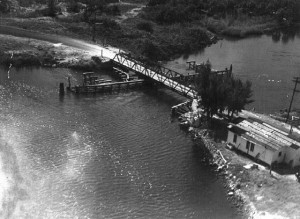 their steam engines. This stop-over allowed local farmers to load the train up with fresh vegetables, grown here in the winter time, to carry to northern markets. Jim and Emory Butler were the first members of their family to come here, and they were so successful that other family members eventually followed. Their sister, Nellie Lee Butler, married William Belton Jones of Georgia and moved here in the 1930’s. Belton Jones and his son Berney became the first bridge tenders at the Hillsboro Ave. and Intracoastal Waterway bridge. Eventually, their other five sons, Clarence, Osrich, Leo, Alvin and Emery Jones, also moved here from Georgia, as well as their daughter, Corrine Riley. Emery and Alvin Jones were my father, Marlin’s age, and the three of them became good friends. In fact, my Dad had gotten into the trucking business about that time, hauling fertilizer from Port Everglades to the Lake Okeechobee farms, and occasionally Emery Jones would go with Dad for the ride and give him a hand. The Jones boys were
their steam engines. This stop-over allowed local farmers to load the train up with fresh vegetables, grown here in the winter time, to carry to northern markets. Jim and Emory Butler were the first members of their family to come here, and they were so successful that other family members eventually followed. Their sister, Nellie Lee Butler, married William Belton Jones of Georgia and moved here in the 1930’s. Belton Jones and his son Berney became the first bridge tenders at the Hillsboro Ave. and Intracoastal Waterway bridge. Eventually, their other five sons, Clarence, Osrich, Leo, Alvin and Emery Jones, also moved here from Georgia, as well as their daughter, Corrine Riley. Emery and Alvin Jones were my father, Marlin’s age, and the three of them became good friends. In fact, my Dad had gotten into the trucking business about that time, hauling fertilizer from Port Everglades to the Lake Okeechobee farms, and occasionally Emery Jones would go with Dad for the ride and give him a hand. The Jones boys were
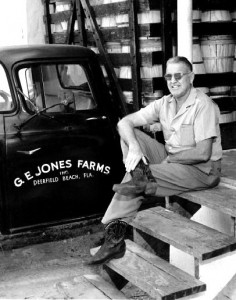
also good farmers. Whereas the Butlers were mostly growing beans, the Jones got into staked tomatoes. They were so successful that when Alvin Jones decided Deerfield needed a bank in the 1960’s, he started Deerfield Bank and Trust Company, which was Deerfield’s first and only bank for many years. Emery’s daughter, Janice Jones Stills, is a retired school teacher still living in Deerfield; as is Kenneth Jones, Alvin’s second son, who is retired from the banking business. When my Grandfather, Hoyt Eller, decided to retire in the 1950’s he sold his farm west of Boynton to Alvin Jones for a little over $50,000, which allowed Granddad to retire. Alvin grew tomatoes on it for thirty plus years. J.B. Wiles once told me that when Alvin’s widow, Mary, eventually sold my Granddad’s old farm, she got a little over $15 million for it. He then said, “What do you think about that!” I said, “God Bless her, and God Bless America!”’
David Eller, Publisher
Historical Essay 33
In 1952 we got our first new car…and our first television set…
Published: 5 Jun 2008
Dad’s manufacturing business by 1952 was going great guns. His new patented Slice-O-Lator land clearing machines were the main reason, but the pump business was also doing well. He had enlarged the factory on Dixie Highway just on the west side of Pioneer Park, bought some more lathes, hired more welders and even got a secretary for his office. The secretary was the twenty-something-year-old daughter of a family from Georgia who had recently moved into town, and was renting a house Dad owned down the street. Her name was Lanette, and I could tell immediately that Mom didn’t like her. At first it was something about the short shorts she wore around town being too short. After she applied to work for Dad and he hired her, the girl started wearing high-heeled shoes and fancy dresses to work. Mother really didn’t like that. Dad apparently agreed and admitted that his workers were spending too much time in the office. So his new secretary started wearing blue jeans to work. Mother said something to the effect that the jeans were so tight that she must be pouring herself into those jeans every morning. As a 10-year-old boy, I couldn’t figure out what Mother meant, but the next thing I knew Lanette didn’t work there anymore, and mother was working in the office part-time. Lanette and her family moved back to Georgia a few months later, and Mom worked in the office the rest of her life, some 36 years. Dad also bought us our first TV set that year. Mother had been after Dad to get us a TV set ever since I’d gotten in trouble breaking into Allen Ballard’s house to watch TV (see Historical No. 30). Dad resisted
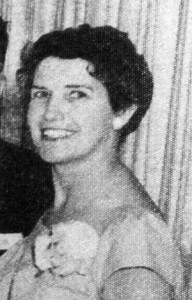
buying the TV because he’d just spent a lot of money buying us a new Chevrolet from Mayes Chevrolet in Pompano. “Bugs” Hardy, the salesman, worked real hard to get Dad to buy that car. The word that Dad was spending money apparently made its way over to Wesley Parish’s General Electric Store on Atlantic Boulevard in Pompano. Wesley, who had gone to Pompano High School with Dad, called and invited Dad to come look at the latest TV sets. The new black and white screens were 14 inches measured diagonally, which apparently impressed my father since the ones before that had only been about 10 inches. So on Saturday afternoon our family got into our new Chevrolet and drove to Pompano to shop for a TV. I was really happy. Wesley met us and started going over how the TV worked. Dad asked a lot of questions. But when it got to the price, I could tell Dad was not pleased. He finally shook his head, turned to leave, and told Mr. Parish to call when the price went down. I looked at Mother and could tell she was disappointed and embarrassed. We all followed Dad out the store, and Mr. Parish followed us to our car. He told my Dad that he would try to do something about the price, but meanwhile would Dad allow him to bring the TV to our house in Deerfield for us to try it for a week. My sister and I started shouting “Yes Dad!” “Please, Dad!” I looked at Mother, and she was smiling. Of course, Dad reluctantly agreed. After a week, all of us, including Dad,
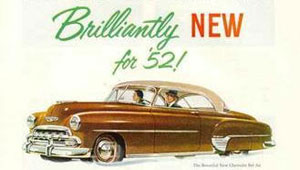
were watching TV each night. There was no way Dad could have refused to buy it. It was a lesson I took note of, and many years later used to sell our own products. When Wesley came to pick up the TV the next Saturday, Dad wrote him a check for the TV. It was only the third TV in Deerfield Beach. Our lives changed forever.
David Eller, Publisher
Historical Essay 32
Playing baseball beat out Scouting
Published: 22 May 2008
1952 was a busy year in Deerfield. My father, Marlin Eller’s decision to run for City Commission as described in previous essay No. 31, was going to keep him busy during much of the year… Meanwhile, I had joined the Boy Scouts in January, along with a few of my 10- and 11-year-old friends. Mr. Dickens was our Scout Master. He was also a school teacher at Pompano High School, teaching shop class. The main reason we joined was that Mr. Dickens told us we could all camp out in tents and fish on his and his wife’s acreage. It was located about five miles west of downtown Deerfield, on the west side of the Turnpike, right on the Hillsboro River/Canal, where the Adios Golf Club is today. He also had rock pits there with perfectly clear water full of bass. It was a beautiful spot, and his son Johnny Dickens, who was already 13 years old, would be our leader. It was a lot of fun for a few months. We memorized a lot of things and swore to be loyal to God and Country. We all started off as Tenderfoots, received a few pins and moved up to Second Class and some to First Class as we learned and advanced in Scouting. However, the opportunity to play Little League Baseball suddenly entered the picture. Deerfield did not have enough boys to support both Boy Scouts and Little League Baseball at the same time. I distinctly remember Mr. Dickens telling us that if we chose to play in the Little League Baseball Team being organized, it would conflict with being Boy Scouts, and we needed to decide which we wanted to do. It took me a minute or two to decide that I’d rather play baseball. Everyone else made the same decision, which ended the Boy Scout experience, and began my three-year baseball career. This is a picture of the first Little League Baseball team in Deerfield Beach. It was 1952. This writer, David Eller, is the second from the left, standing up, with his eyes shut. I was a left-handed pitcher known for a mean curve or drop ball. I learned to pitch from a professional ball player named Herb Dudley. He had pitched on the official U.S. Navy Softball team, with my mother’s brother, Uncle Forney Horton being his catcher. After the war, Dudley had taken a job with the Boca Raton Hotel, who paid him to pitch for their official softball team. He spent a lot of time eating meals at our house. After eating we would go in the backyard, and he would teach me how to pitch curve balls, drop balls, and even an occasional knuckle ball. When not pitching, I played shortstop or first base. The player to my left, with our arms around each other, is Donald “PeeWee” Williams. He played shortstop or second base. His father owned the Williams Dairy in Deerfield on the property which he later sold to Irvin Levy, who built Century Village on it. PeeWee’s father also helped sponsor our teams’ uniforms, and did some coaching. To my right was a big red-headed boy named Lee King, an outfielder whose favorite past-time was hitting home runs, bull riding and fighting. Next to PeeWee was Dewey Bennett, our catcher. I can’t recall the short fellow next to Dewey, but the taller fellow with his arm around him is Henry Harden, a fastball pitcher and the only member of our team who went on to become a professional baseball player. My buddy, James Stills, who played outfield is next to him. In the front row are Steve Rowe, a third baseman and the son of Rev. Bob Rowe, the Baptist preacher at First Baptist. He substituted at several positions, but mainly second base. Next to him is Ray Boggs, a pitcher and first baseman. Substitutes Kenny Bennett and Pete Manning rounded out the team. Our coaches were all policemen: Lloyd Newman, Roy Bennett and Chief Manning. Our biggest fans were probably Presbyterian Minister Reverend Arlen Briggs and his wife, Margarett, who had recently moved to town and attended nearly every game. Within two years of this picture some of us would earn our participation in an All Star Broward County Team, which beat Miami, Palm Beach and Orlando, and went to Greenville, North Carolina, representing the State of Florida in the National Little League championship series in 1954. We had a lot of fun and learned about values like discipline, loyalty and hard work.
David Eller, Publisher
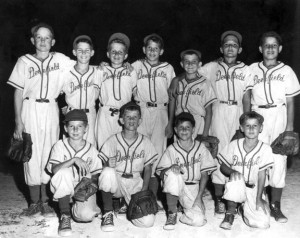
“Pee Wee” Williams recalls DB Little League Dear David: This is a “voice from the past,” saying it has been a long time indeed! I wanted to write you, and let you know, that a friend, read your article of March 6, 2008, on the history of Deerfield Beach, Fla., and mailed me a copy. It was a nice surprise to me to see your name on this newspaper article, and that you remembered my father and me, and his family in such a nice memory. Thank you so much. My father enjoyed being involved in the community of Deerfield Beach, Florida, with Little League Baseball. I enjoyed playing the game, going through high school baseball in Pompano High. My father moved his dairy to Okeechobee County, Bassinger, Florida, in 1960, and continued to be involved with Little League Baseball. There was no organization for little league baseball at the time, just a few games a few teams, etc. My father sponsored the “Indians,” and I was the coach. We had a great time building the baseball field in his honor. I am very proud of that. I found this picture in my album of our ball team when you and I were little guys. You are second from left, standing, I am third from left, standing next to you. This picture does bring back some good memories.
Sincerely , Don “Pee Wee” Williams
Historical Essay 31
My dad, Marlin Eller, gets into politics
Published: 1 May 2008
I was 10-years-old in 1952 when my father, Marlin, decided to run for the Deerfield Beach City Commission. I remember my mother, Lorena, was not happy about it. She did not want Dad to get involved in politics. In retrospect, I realize that mother knew his tendency to be outspoken, knew what some of his issues would be, and was concerned that he would probably create some enemies within the establishment in the community. Besides, Dad’s business had started to grow rapidly. The U.S. Government had recently awarded him a patent on a land-clearing machine, which he called a “Slice-O-Lator”, and the farmers were almost standing in line waiting to buy them at $500 each. He eventually sold hundreds of them, and had to hire more people, and expand the little factory on Dixie Highway, to keep up. Dad had also come under the influence of Deerfield’s first lawyer, “Dutch” Ulrich, who had just recently moved into town and caused a minor uproar at city hall when he insisted on registering to vote as a Republican. It seems the city clerk had only one book for registering voters, and it was marked “Democrat”. This was typical of southern USA towns at the time as a carryover from the War Between the States, or Civil War, wherein Lincoln’s Republicans were victorious over southern Democrats, and some ill will continued in the South even a hundred years afterwards. Apparently all voters in Deerfield, including my dad and mother, had been registered as Democrats until “Dutch” came along, and the city clerk, Mr. Richardson, had to drive to Pompano to buy another book for Republicans. Anyway, I remember “Dutch” coming to our house one night and talking to Dad about running for the city commission in order to straighten out some things in town which both he and Dad thought were wrong. For one thing, a U.S. senator from Tennessee by the name of Kevaufer had recently held congressional hearings in Ft. Lauderdale having to do with the influence of illegal gambling on Broward County politics. In seemed that an illegal game of chance called bolito was going full blast with the full cooperation and protection of some Broward political, business and police interests. I remember Dad saying that it was a problem in Deerfield, too, as a lot of the workers in our little factory were spending most of their money on this illegal game, resulting in their wives coming to Dad to borrow money to buy groceries. Dutch Ulrich convinced Dad that someone needed to stand up for right, and convinced Dad to run for city commission by quoting the famous Edmund Burke: “ The only thing necessary for the triumph of evil is for good men to do nothing.” Dad agreed and signed up to run for Deerfield City Commission. At 35 years of age, with a wife, three children, and a growing business in town, he was also frustrated about some other situations. For instance, Deerfield had a nice beach, but there was no place for people to change clothes or take a shower after swimming; and there was no pier on which to go fishing. Dad had recently bought a 14-foot fishing boat, but there was no boat ramp in Deerfield to launch it. Deerfield’s streets were not marked with any street signs, so it was difficult for strangers to figure out how to find their way around. The town had just built a water plant, and the water was being pumped to an elevated tank, but it did not taste right. There were rumors that not everyone was being billed for, nor paying for water. The town had a substantial black population, but all three Deerfield policemen were white, and reportedly afraid to go into Deerfield’s black areas to enforce the law. Thus, Marlin Eller, my Dad, having lived in Deerfield since he was eight years old, and now 35 years old in 1951 and committed to stay here, filed his papers to run. Politics in Deerfield was about to get interesting.
David Eller, Publisher


